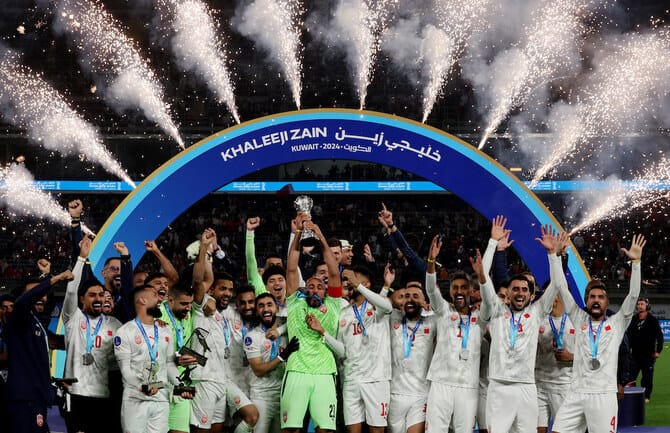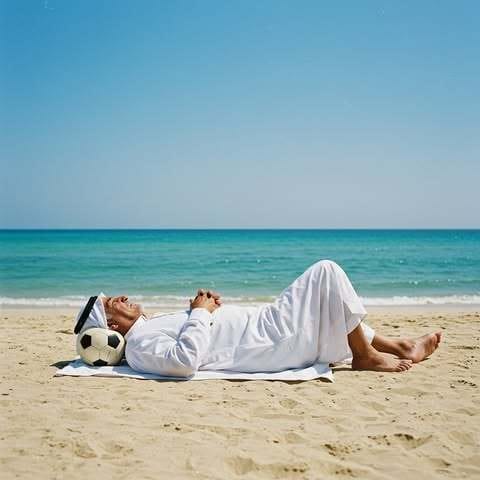- The Dyorama
- Posts
- Kuwait’s Bold Play in the Gulf’s Sports Tourism Game
Kuwait’s Bold Play in the Gulf’s Sports Tourism Game
Omar Ramy
Staff Writer
In the fierce race to dominate the sports tourism industry, Saudi Arabia and the UAE have enhanced the region’s presence in sports entertainment and made headlines with grand spectacles like the Abu Dhabi and the Saudi Arabian Grand Prix. Additionally, Saudi Arabia has recently secured the 2034 World Cup and WWE’s Royal Rumble 2026 in Riyadh. But while the spotlight often shines on these regional powerhouses, a quieter yet striking contender has entered the arena: Kuwait.
Hosting the 26th Arabian Gulf Cup December through January, also known as Khaleeji Zain 26, Kuwait not only delivered a seamless regional spectacle, but it also redefined its image as a travel destination. It was a moment of transformation, where Kuwait showcased its unique charm of authenticity among its neighboring nations. The Gulf’s underdog’s success was amplified across social media, underscoring Kuwait’s potential to hold its own on the regional sports stage, even against its heavyweight neighbors.
This edition was won by Bahrain after successfully defeating Oman in the final, but Kuwait achieved something even more significant: having contributed to the rewriting of the region’s playbook in sports tourism. It is worth mentioning that since its inauguration, Kuwait has won 10 editions of the cup, making it the most successful nation to win this cup.

Bahrain’s national team celebrates win at Gulf Cup. Source: Reuters
Economic Benefits
Kuwait not only successfully hosted and won the cup over the years, but also benefited significantly from hosting the event, leveraging it as a pivotal milestone in its broader rebranding strategy. Kuwait gained around USD 197 million from hosting the cup, with an average spend of 380 USD per day per attendee.
The matches collectively attracted 400,000 attendees, with an average of 26,000 per match. This edition has generated traffic for Kuwait, receiving around 69,000 tourists. The revenue generated and the number of tourists contributed to a significant ROI for sports tourism, which aligns with the country’s economic diversification vision for 2035.
“In the Federation, we appreciate this partnership with Zain through our commercial partners IMG, and we are looking forward to a successful competition in this edition too. This partnership with Zain will enhance the Arab Gulf Cup edition in Kuwait, especially as it attracts football fans in the region, and we hope to continue this association for the long term,” Secretary-General of the Arab Gulf Cup Football Federation, Jassim Al-Rumaihi stated.
One of the main attractions that witnessed huge traffic during the event was The Avenues mall. The mall was able to capitalize on the event through gaining visitors, while showcasing the nation’s warm hospitality. The Avenues posted on their TikTok account that their fan zone is free of charge, no reservations, while offering cultural shows, food and endless entertainment.
The increased demand on restaurants was all over the country. Fahad Al-Arbash, Chairman of the Kuwait Union of Restaurants, Cafes, and Food Supplies noted that the event was able to uplift the local economy due to the influx of tourists, with restaurants at heritage sites witnessing a 30 to 40 percent increase in sales.
Khaleeji Zain 26 has led to a 100 percent hotel occupancy rate during the event. This success led to speculation that Kuwait is on its way to restoring its glory and position in the region through a rebranding strategy that showcases its identity and culture.
Cultural and Social Impact
Other than the economic benefits, Khaleeji Zain 26 helped reshape Kuwait’s image as a travel destination, positioned as a cultural and social hub in the region. Citizens were able to unite with other nations in the region through highlighting their shared culture and showcasing regional solidarity.
The Gulf country capitalized on its resources and venues, such as Souq Shark, Al-Muroj, and Al Shaheed Park, to showcase its rich cultural heritage, contributing to the event's success. These venues and many others hosted interactive exhibits and cultural events that served as lively fan hubs.
A video posted on TikTok highlighted the festive atmosphere and offerings at Souq Shark, which offered free entrances from 21 December 2024 to 3 January 2025. Fans got the chance to watch the games, enjoy unlimited entertainment and experience Kuwait’s authentic food. Respectively, Souq Al-Mubarakiya was covered with flags from all participating nations, creating a warm atmosphere filled with visitors proudly carrying their national team’s flag, united through sharing memorable moments. It is estimated that with these interactive and compelling experiential spaces, fans sharing their fun online could have possibly reached a wider audience of 2.1 million people in the GCC.
@blogskww 📍souqsharq until the 3rd of january 😍💙🇰🇼🍕🍿🍕‼️
Operational Success
Overall, the event excelled in delivering a flawless experience for its visitors through its successful marketing campaigns, seamless stadium experience and coordinated travel arrangements. This was achieved through the alignment between Zain, Kuwait Airways and governmental bodies that were essential to the operational success.
One attendee noted that there were volunteers to provide aid at every step in the stadiums, even individuals with wheelchairs were able to navigate easily. While another attendee stated, “Even with 60 or 70 thousand people, it felt like being in a mall—crowded but orderly. The flow in and out of the stadium was smooth, the seats accommodated everyone, and around ten gates were placed, which ensured quick access,”
Many of the fans who attended the event documented their experiences on social media to praise and showcase what they witnessed at the hidden pearl of the GCC, which boosted the country’s reputation as a tourist destination. Ultimately, this event highlighted the country’s capability to work and align on strategic partnerships.
Future Prospects
Sports tourism seems to be a vital segment in Kuwait’s economic diversification plan. The sports events market revenue in Kuwait is speculated to reach USD 54.90 million in 2025. This figure shows a significant rise compared to the revenue in 2020 of 11.62 million USD. Moreover, it is speculated that the market revenue will reach 58.78 million USD in 2028.
With the remarkable organizational success of the regional event, Zain has announced that they will strategically partner with the public sector to support Kuwait’s largest tourism initiative, Ya Hala Shopping Festival. This move highlights Kuwait’s growing commitment to enhancing its appeal as a premier tourist destination, inviting visitors to explore its cultural and economic evolution.
The shopping festival will take place from January through March offering endless discounts, drone shows, entertainment, giveaways and hospitality for visitors. This partnership supports Zain’s vision to promote national development goals.
The competition in the Gulf has been booming over the past years, with most of its countries striving to shine and effectively attract tourists. This competition generated significant improvements in each of its countries' stances in the region. While some countries are trying to gain traction through festivals to showcase their heritage and provide an unmatched experience to their visitors, the sports sector seems to be a rising star in enhancing the tourism industry. The Gulf’s competitiveness has delivered exceptional results across the region. Kuwait with its new focus on sports tourism and cultural integration is set to become a major player in this booming industry.


Reply